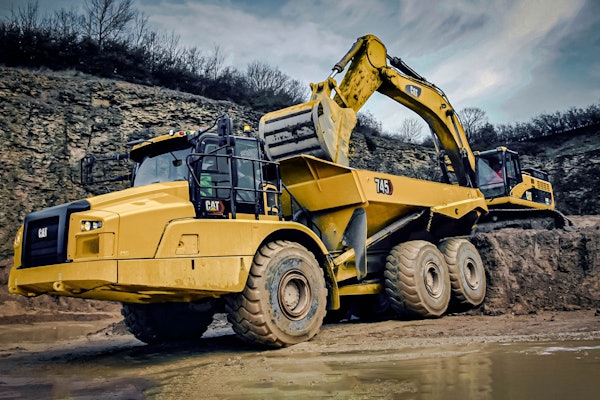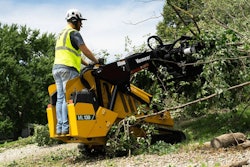Is expanding your business into a specialized field a good idea? It can be for a variety of reasons as three very different contracting firms found out when they turned to concrete as a way to not only increase their profits, but offer a more complete construction package to their clients.
Gary Heinrich is senior project manager and chief estimator for Charles J. Merlo, a 46-year-old heavy-highway contractor in Mineral Point, Pennsylvania. “We did earthmoving, drainage and bridge structure work, but no paving of any of any kind,” Heinrich recalls.
Despite the company’s long record and expertise in that type of work, Heinrich says the company felt it was losing its competitive edge because it could not self-perform concrete paving, which can be a significant portion of any highway project. “There were a couple of things that drove our move into the concrete paving business,” he says. “The main reason was that it gave us a leg up on bidding state jobs. We would bid jobs, and had good earthmoving and structure numbers, but we had to take subcontractor pricing on the concrete paving.
That’s when we realized that if we were ever going to get back and be competitive for these jobs, we were going to have to take the plunge and buy a concrete paver.”
Merlo turns to its own for paver expertise
Though Heinrich and his fellow Merlo officers knew a move into concrete paving was inevitable, they continued to analyze and discuss the expansion without taking any decisive action. Finally in late 2001 a job came up for bid that forced the company’s hand. “It was a highway project in Altoona, Pennsylvania,” Heinrich remembers. “We ran the numbers and found that we could bid it competitively and probably get it. But we were going to have to buy a paver to do it.”
After getting some basic figures on buying a GOMACO Commander III paver, Merlo bid the job with 48,000 square yards of concrete and was the low bidder. The next problem was finding a crew to run the machine. Conventional wisdom says hire specialists. Instead, Merlo simply turned to its employees. “We knew we needed somebody who was knowledgeable about concrete characteristics to be the paving superintendent. Our general concrete superintendent, Jim Swetland, has over 30 years experience in that field – so that wasn’t a problem,” Heinrich says. “And, of course, you need somebody to run the machine. Our GOMACO rep explained that the main criteria was finding somebody who was adept at running power equipment who also has some basic computer control skills, because the Commander III uses electronic-over-hydraulics. We had four or five real good candidates in our company who could do that.”
Bonuses earned right out of the box
Once on the job, Heinrich reports, things went smoothly for Merlo, even with a rookie crew at the helm of their new paver. Because the company already had a large fleet of equipment, it initially wasn’t going to acquire any ancillary machinery to support the paver. But that changed relatively quickly.
“We were going to have mixer trucks simply dump the concrete on the ground in front of the paver as we worked,” Heinrich says. “But to get the good product that we wanted – 1- to 1-1/4-inch slump concrete – we thought it would create problems. So we rented a concrete placement conveyer.” That system worked so well, Heinrich says, that Merlo went ahead and bought it as well.
All told, it was a good coming out party for Merlo’s concrete paving division. “I haven’t seen any documentation yet,” he says, “but we’ve heard that Penn DOT may submit that first job for a national concrete paving award because its ride quality is so good. Our production was very good, and we earned ride quality bonuses on about 80 percent of the lots on the job.”
Today, Heinrich says the concrete paving expansion has been hugely positive for his company. “The outlook for us in this business is great,” he says. “We’ve picked up another $25 million of work on account of that machine – and that’s all new money that we previously wouldn’t have had a chance to earn. And we got those jobs specifically because we are now able to do concrete paving work.”
NESC started out as a flooring contractor and moved into curb-and-gutter work when it couldn’t find a subcontractor to install 5,500 feet of concrete bridge parapets.
An ‘under the gun’ decision works well
Some companies decide to move into concrete construction work. Others don’t really have a choice. That was the case for New England Specialty Concrete, a Salisbury, Massachusetts, company that now specializes in variable-barrier-wall and curb-and-gutter concrete work.
Six years ago, the company was just doing flooring work, says Tony Petronio, business development manager for NESC. “We did a lot of gypsum flooring – and still do,” Petronio says. But back in 1997, a sister company of NESC’s had a construction job on its hands that called for the installation of 5,500 feet of concrete bridge parapets. “They were under the gun,” Petronio says, “but couldn’t find any slipform company willing to tackle the job for various reasons. As the clock ticked down, we all looked at each other and said, ‘Well, it looks like we’re going into the concrete business.'” So NESC purchased a Power Curber 8700 three-post and went to work. “The paver did a great job,” Petronio says. “The highway department was very pleased with it.”
And like C.J. Merlo Construction, NESC opted to stay within the family when it came to manning its new paver. “We’ve got some pretty versatile people working for us,” Petronio adds. “One of our guys just took to the paver right away. And of course Power Curbers supplied us with technicians and product support to help us get up and running.”
Six months later, the work NESC did on that initial parapet job landed them another 6,500 feet of grade barrier work for another division of the Massachusetts Highway Department. “We bought another mold and did that job,” Petronio says, “and it worked out very well for us.”
There is no question in Petronio’s mind that moving into the concrete business was a good move for his company. Since that first job, Petronio says the company has continued to evolve its concrete services by getting into concrete barrier work and adding two more pavers to its fleet. “Last year we did about 80,000 feet of curb work,” he says. “And we’re shooting for something in the neighborhood of 150,000 feet in 2004.”
Concrete pads and foundations pay off
Concrete paving is an ambitious goal that not every small company can set its sights on. But expanding a small site prep or earthmoving firm into more basic types of concrete work can pay dividends as well.
Just ask Tim Ward, president and owner of Ward’s Excavations and Concrete, Vershire, Vermont. Ten years ago, Ward and his wife Kelly founded their small construction firm, which at first specialized in dozer work. A couple of years later, Ward bought a used excavator and expanded their business to include complete site work, building roads, driveways and ponds, digging in-ground septic systems and doing prep work for concrete pads and foundations for residential customers.
The concrete prep work got Ward to thinking. “For me, the decision to expand my business began because I was always running into problems with scheduling,” Ward recalls. “I would go in and prep a site, and then have to move my equipment out and wait for the concrete guys to come in and pour a foundation.”
Once that foundation was poured, Ward would move his equipment back in and finish the job. “This was really ruining my job and equipment planning,” he says. “And the added cost of moving equipment off and back onto a jobsite was costing me money.”
It occurred to Ward that if he took on the concrete work himself, his scheduling problems would abate. “Another advantage was that my customers would only have to deal with one person to get all this work done,” he says. “That’s a business advantage for me because it’s a lot easier for whoever is overseeing a project to just hand one person a set of blueprints and say, ‘This is what I need in order for my carpenter to go to work.'”
A more complete construction package
The more he thought about getting into concrete work, the more Ward realized it was a logical extension of his business. So about four years ago, he decided to go for it. His first step was to poll his clients, finding out if they’d be willing to support his expanded business. Most, he found, were happy to do so. “Almost all of them told me they preferred dealing with a contractor who offered a full line of services,” he says.
So Ward asked for help. “As my business grew, I’d started using self-employed construction workers as subcontractors,” he says. “And a couple of them had expertise working with forms, pads and foundations. So I hired them as subs to basically teach me the ins and outs of pad and foundation work.”
He then bought concrete equipment. Ward didn’t want to tie up a large amount of money in what could be a gamble. So he opted to buy good-condition used equipment, such as a complete set of used advanced forms, and then expanded by adding power trowels, vibrascreeds and hand tools. “I started out with used equipment because its depreciation wouldn’t be as severe as new equipment would,” Ward says. “I figured I’d be able to get my investment back.”
More money for more jobs
Today, Ward is enthusiastic about his move into concrete. “I found out that it is very labor-intensive work,” he says. “And hiring laborers is a little tougher to do than I expected. But
I really didn’t find anything that I didn’t anticipate.”
And the impact on his small construction business has been tremendous. “I’m getting more jobs and I’m making more money on them,” he says. “I recently purchased brand-new forms, screeds and trowels, and this summer, for the first time, I’m looking at hiring my first full-time employees.”










